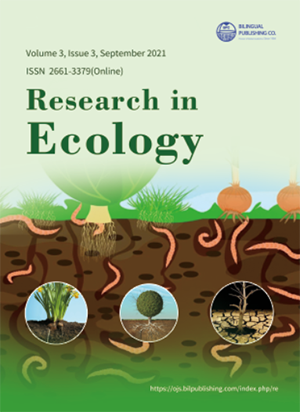
A Review of Research on Ecological Economics Based on Bibliometrics
DOI:
https://doi.org/10.30564/re.v3i3.3685Abstract
The development of ecological economics is a major strategy for development in the 21st century. Although scholars have been rising more and more interesting for ecological economic over the past 10 years, it is still unclear what is the change will be facing in the future. In order to provide a theoretical basis for the future development of ecological economy, our article analyzes the current research progress of ecological economy on the basis of a bibliometric analysis. The results show that (1) sustainable development of an ecological economy is a hot research topic; (2) there is little cooperation and exchange between institutions and among scholars regarding ecological economics; (3) the number of publications on ecological economics is increasing, with a relatively large number being published in China. Therefore, we must strengthen the cooperation between institutions and among scholars and improve the research content, vision, and methods in this field. This study provides a theoretical basis for the future development of ecological economy.
Keywords:
Ecological economy; Industrial ecology; Bibliometric analysis; CitespaceReferences
[1] Wang SJ. A Few Basis Points of the Ecological Economy. Advanced Materials Research, 2015, 3702: 2871-2874.
[2] Jiang CX: Study on the Accelerated Establishment of a Legal Ecological Civilization System in the “New Normal” Economy. Lee G, Wu Y, editor, 2015 3rd International Conference on Social Science and Humanity, 2015: 503-507.
[3] Bockman J. The Long Road to 1989: Neoclassical Economics, Alternative Socialisms, and the Advent of Neoliberalism. Radical History Review, 2012, 2012(112) : 9-42.
[4] Thomas PD. Only One Earth: The Care and Maintenance of a Small Planet. By Barbara Ward and Rene Dubos. (New York: Ballantine Books, Inc., 1973. 288 pp. Index. Paper. $1.50.). Forest & Conservation History,1973,17(3):37-38.
[5] Rome A. Only One Earth: The Care and Maintenance of a Small Planet. Nature, 2015, 527(7579): 443-445.
[6] Rojstaczer S, Sterling SM, Moore NJ. Human Appropriation of the Products of Photosynthesis. BioScience, 1986, 36(6):368-373.
[7] Costanza R, Daly HE. Towardanecological economics. Ecological Modelling, 1987, 38(1-2): 1-7.
[8] Zhu WC, Liu S. Evaluation and analysis of coordinated development of ecological environment andeconomy. Fresenius Environmental Bulletin, 2021, 30(5): 4798-4803.
[9] Clark CW. The economics of overexploitation. Science,1973,181(4100): 630- 634.
[10] Chen SY. The evaluation indicator of ecological development transition in China’s regional economy. Ecological Indicators, 2015, 51: 42-52.
[11] Shi T. Ecological economics as a policy science: rhetoric or commitment towards an improved decision-making process on sustainability. Ecological Economics, 2003, 48(1) : 23-36.
[12] Melgar-Melgar RE, Hall CAS. Why ecological economics needs to return to its roots: The biophysical foundation of socio-economic systems. Ecological Economics, 2020, 169.
[13] Xu MY, Chen CT, Deng XY. Systematic analysis of the coordination degree of China’s economy-ecological environment system and its influencing factor. Environmental Science and Pollution Research, 2019, 26(29): 29722-29735.
[14] Ozkaynak B, Devine P, Rigby D. Whither ecological economics?. International Journal of Environment and Pollution, 2002, 18(4): 317-335.
[15] Estoque RC. A Review of the Sustainability Concept and the State of SDG Monitoring Using Remote Sensing. Remote Sensing, 2020, 12(11): 1770.
[16] Karobliene V. The Sharing Economy in the Framework of Sustainable Development Goals: Case of European Union Countries. Sustainability, 2021, 13(15): 8312.
[17] Fatima T, Meo MS, Bekun FV, et al. The impact of energy consumption to environmental sustainability: an extension of foreign direct investment induce pollution in Vietnam. International Journal of Energy Sector Management, 2021.
[18] Han F, Feng Z, Wang C, et al.Interweaving industrial ecology and ecological modernization: A Comparative Bibliometric Analysis Sustainability, 2021, 13(17): 9673.
[19] Ullah A, Ahmed M, Raza SA, et al. A threshold approach to sustainable development: Nonlinear relationship between renewable energy consumption, natural resource rent, and ecological footprint. Journal of Environmental Management, 2021, 295(5): 113073..
[20] Bettencourt LMA, Kaur J. Evolution and structure of sustainability science. Proceedings of the National Academy of Sciences of the United States of America, 2011, 108(49): 19540-19545.
[21] Sun XS. Green city and regional environmental economic evaluation based on entropy method and GIS. Environmental Technology & Innovation, 2021, 92(9): 101667.




 Yin Huang
Yin Huang





